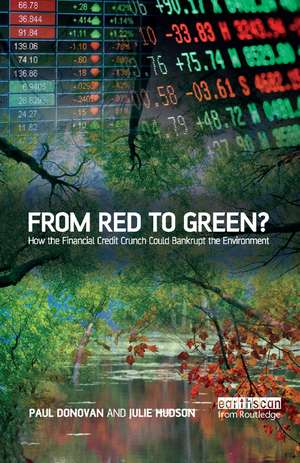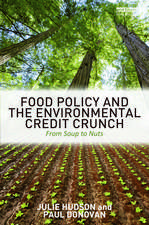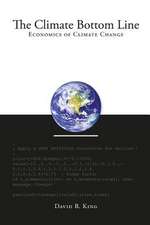From Red to Green?: How the Financial Credit Crunch Could Bankrupt the Environment
Autor Paul Donovan, Julie Hudsonen Limba Engleză Paperback – 6 iun 2019
| Toate formatele și edițiile | Preț | Express |
|---|---|---|
| Paperback (1) | 323.23 lei 6-8 săpt. | |
| Taylor & Francis – 6 iun 2019 | 323.23 lei 6-8 săpt. | |
| Hardback (1) | 1007.48 lei 6-8 săpt. | |
| Taylor & Francis – 5 aug 2011 | 1007.48 lei 6-8 săpt. |
Preț: 323.23 lei
Nou
Puncte Express: 485
Preț estimativ în valută:
61.87€ • 67.23$ • 52.00£
61.87€ • 67.23$ • 52.00£
Carte tipărită la comandă
Livrare economică 21 aprilie-05 mai
Preluare comenzi: 021 569.72.76
Specificații
ISBN-13: 9781138380165
ISBN-10: 1138380164
Pagini: 256
Dimensiuni: 156 x 234 x 14 mm
Greutate: 0.45 kg
Ediția:1
Editura: Taylor & Francis
Colecția Routledge
Locul publicării:Oxford, United Kingdom
ISBN-10: 1138380164
Pagini: 256
Dimensiuni: 156 x 234 x 14 mm
Greutate: 0.45 kg
Ediția:1
Editura: Taylor & Francis
Colecția Routledge
Locul publicării:Oxford, United Kingdom
Public țintă
Professional Practice & DevelopmentCuprins
Introduction 1. Food 2. Water 3. Energy 4. Infrastructure 5. Housing 6. Consumer Durable Goods 7. Fast Moving Consumer Goods 8. Health 9. Education, Work and Leisure. Conclusions. Bibliography. Index
Notă biografică
Paul Donovan is a Managing Director and Global Economist at UBS. Paul is responsible for formulating and presenting the UBS Investment Research global economic view, drawing on the bank's world-wide resources. He co-authors the Global Economic Perspectives publication with the other members of the Global Economics team and has focused in recent years on income inequality, monetary union and currencies, government policy, and monetary economics.
Julie Hudson, CFA, is a Managing Director at UBS, where she heads up the new Socially Responsible Investment effort established by UBS within its Equity Research division at the end of 2004. The team launched UBS publications on climate change in 2007, on corporate governance in 2008, and on ESG (environmental social and governance issues) and their impact on competitive markets in 2010.
Julie Hudson, CFA, is a Managing Director at UBS, where she heads up the new Socially Responsible Investment effort established by UBS within its Equity Research division at the end of 2004. The team launched UBS publications on climate change in 2007, on corporate governance in 2008, and on ESG (environmental social and governance issues) and their impact on competitive markets in 2010.
Recenzii
'Donovan and Hudson’s original and highly readable book clearly identifies the true cost of living beyond one’s means. Their analysis of how environmental problems are influenced by today’s economic challenges offers a fresh insight for policy makers.' - Rt Hon Danny Alexander MP, Chief Secretary to the United Kingdom Treasury
'This thoughtful and timely book is an essential read for policy-makers, business leaders and investors who have the power and influence to determine whether we can survive the environmental crunch.' - Emma Howard Boyd, Head of Socially Responsible Investment and Governance, Jupiter Asset Management
"This highly topical book brilliantly pulls together the two major global challenges of the day - this is essential reading for financiers, policy makers and environmentalists alike." - Professor Sir David King, Director of the Smith School of Enterprise and the Environment (Oxford University)
'This thoughtful and timely book is an essential read for policy-makers, business leaders and investors who have the power and influence to determine whether we can survive the environmental crunch.' - Emma Howard Boyd, Head of Socially Responsible Investment and Governance, Jupiter Asset Management
"This highly topical book brilliantly pulls together the two major global challenges of the day - this is essential reading for financiers, policy makers and environmentalists alike." - Professor Sir David King, Director of the Smith School of Enterprise and the Environment (Oxford University)
Descriere
Written by an economist and an investment professional, this book addresses the twin crises that the world is facing in the form of a simultaneous financial and environmental credit crunch. Financially, consumers are less able to consume now, and pay later. Environmentally, we may have already reached our credit limit and the bill for past financial and environmental consumption is falling due.





















